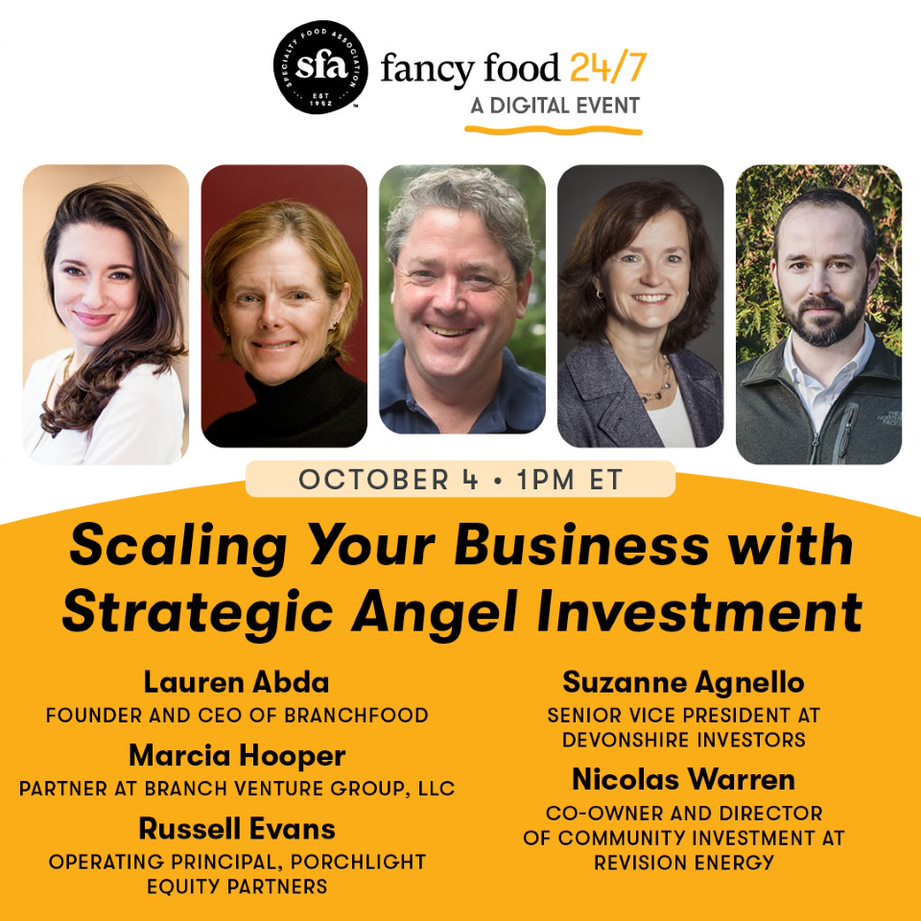Entrepreneurs seeking to grow their businesses with the help of angel investors should take the time to get to know these potential partners well and to understand completely the terms of the deals they might be offering, according to presenters taking part in a Fancy Food 24/7 session, Monday.
“Working with investors is much more like a marriage than dating, because once somebody puts money into your company, you’re joined, and it’s hard to get a divorce,” said Marcia Hooper, a partner at Branch Venture Group, an angel investing group that works with food startups and related companies.
Just like the investors conduct due diligence on the companies they might be investing in, entrepreneurs should be sure they are comfortable working with their investor partners and within their terms, she said. Business owners need to understand the different types of investment structures that angel investor might offer — convertible bonds versus simple agreements for future equity (SAFE) investments, for example.
The former allows investors to earn interest on their investment before they convert to an ownership stake, while SAFEs allow investors to take an ownership stake when certain triggers are met.
“Don’t agree to anything until you understand it,” said Suzanne Agnello, senior vice president at Devonshire Investors, which is affiliated with Fidelity Investments.
Any investment agreement that business owners accept should allow them the flexibility to seek more investment at a later date, said Hooper.
“In my experience, most people really underestimate how much capital it takes to launch a successful business,” she said.
Business owners have multiple sources of investment they can consider, depending on the stage they are in in their growth, panelists said. Venture capital firms typically invest in companies that are still working out the details of their growth strategy and where their product fits in the market, while growth equity funding follows later, when companies have their plans largely in place, but need capital to accelerate growth.
Angel investors, and angel investment groups, can provide valuable advice and counseling for startups, the panelists said.
“Within an angel investment group, there might be a mix of people who have run large brands, or people with entrepreneurial experience, and people with experience in investments,” said Nicolas Warren, a former CPG entrepreneur who is now director of community investment at ReVision Energy.
“We are going to be sympathetic—it’s not like Shark Tank where you fail on national TV—there’s a lot of support,” he said. “Most people that go through the experience [of working with angel investment groups] tend to have a lot of good things to say about it, even if they don’t get funded.”
Other advice from presenters on the panel, called “Scaling Your Business With Strategic Angel Investment,” included:
Make sure you are ready when you make your pitch to investors.
Hooper said she looks for companies that have a business plan drawn out for at least the next year.
“You have to be at a point where you can cogently talk about the next 12 or even 24 months,” said Hooper. “What do you want to do? Where do you want to go? How fast do you what to grow?”
For companies that do not have such a plan to clearly articulate these goals, “it’s hard to have a productive conversation” with potential investors, said Hooper.
Business owners also should have realistic expectations about their own business when they make their pitch for investment capital, said Russell Evans, a food-industry veteran who now works as an industry consultant. Companies that present wildly unrealistic valuations of their companies’ potential worth “can, unfortunately, short-circuit the process,” he said.
“Talk to other people before you talk to angels to make sure that your expectations line up with reality, because angels really appreciate that,” he said. “Being realistic brings you a long way.”
Trends are important to investors.
Entrepreneurs who are seeking to capitalize on trends should make sure they are truly following lasting trends and not short-term fads, such as flavors or ingredients that gain some media attention, panelists said.
“The trend is going to provide the tailwind for the product to get into the marketplace,” said Agnello.
Potential lasting trends in the food industry that panelists cited include plant-based products, sustainability, and convenience.
“If you have a high-quality product that is differentiated, and you find a way to tap into Americans’ quest for convenience, you have a winner,” said Evans.
Agnello said she believes companies have an opportunity in the trend around “the intersection between better for you and better for the environment.”
“I think there is going to be a lot of interesting innovation on that front,” she said.
Related: Branch Venture Group's Abda Offers Investment Advice; Financing at Every Stage of Business.

